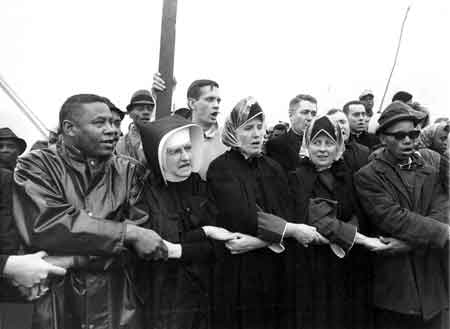
Martin Luther King Day is a time to remember to spread love and unity in a world currently still full of war and racial divide. How can we help to eliminate this current stigma in our nation and celebrate the joy of the gospel, reminding others we are all brothers and sisters who can live in a one earth community with peace? We have compiled some helpful insights from Pope Francis and other resources on how to achieve a genuine path to peace in each nation.
Pope Francis offers “four specific principles which can guid the development of life in society and the building of a people where differences are harmonized within a shared pursuit.” He goes on to say: “I do so out of the conviction that their application can be a genuine path to peace within each nation and in the entire world” (221)
Those four principles are:
1.) Time is greater than space. In Evangelii Gaudium, Pope Francis writes, “Giving priority to space means madly attempting to keep everything together in the present; trying to possess all the spaces of power and self-assertion; it is to crystallize processes and presume to hold them back.” If time governs space, people seek to develop processes in society that engage people and groups and that lead to significant events. Such processes make for full human existence (222-24).
2.) Unity is greater than conflict. It is best to face conflict ‘head on.’ Here one opts for “a resolution which takes place on a higher plane and preserves what is valid and useful on both sides.” This is unity that comes from the Holy Spirit who can harmonize every diversity. Of course, this involves a process of discernment where the views of all are valued and thoroughly considered. This can lead to a “reconciled diversity” within a society or culture or between churches (Evangelii Gaudium 226-30).
3.) Realities are greater than ideas. It is dangerous to dwell solely in the realms of images, rhetoric, concepts and ideas. In Evangelii Gaudium, Pope Francis states “Ideas disconnected from realities give rise to ineffectual forms of idealism and nominalism, capable at most of classifying and defining, but certainly not calling to action.” This principle calls for actions toward justice and charity in imitation of the saints (231-33).
4.) The whole is greater than its parts. While sinking our roots deeply in our native place, we also must keep the bigger picture, the greater good, in mind. “[E]ven people who can be considered dubious on account of their errors have something to offer which must not be overlooked.” Pope Francis’ model here is not the sphere but the polyhedron “which reflects the convergence of all of its parts, each of which preserves its distinctiveness” (Evangelii Gaudium, 234-37).
Bullet points quoted from-https://togoforth.org/2017/09/19/racial-justice-and-peacebuilding-a-perspective-from-the-joy-of-the-gospel/
Other Educational Links:
